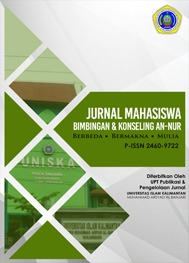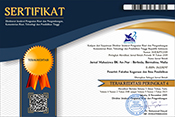HUBUNGAN ANTARA REGULASI EMOSI DENGAN PARENTAL SELF-EFFICACY PADA IBU ANAK PRASEKOLAH KB-TK ‘AISYIYAH DI SIDOARJO
(1) Universitas Muhammadiyah Sidoarjo
(2) Universitas Muhammadiyah Sidoarjo
(*) Corresponding Author
Sari
This study is motivated by the phenomenon of parental self-efficacy. Many school children have maladaptive behavior so parents must have the ability to care for their children. The purpose of this study was to determine whether there is a relationship between emotion regulation and parental self-efficacy of preschool mothers of KB-TK 'Aisyiyah in Sidoarjo. This study used a correlational quantitative method. The population was 205, namely mothers who have preschool children aged 3-6 years old at KB-TK 'Aisyiyah in Sidoarjo. Determination of the sample using saturated sample technique where the entire population is used as a research sample. The data collection technique in this study used a psychological scale in the form of a questionnaire. The data analysis technique used in this study is product moment correlation using JASP 0.16.20. The results showed that the correlation coefficient = 0.213 with a significance of 0.003 <0.05. These results mean that there is a positive relationship between emotion regulation and parental self-efficacy. Thus, the hypothesis proposed in this study is accepted, the higher the emotion regulation, the higher the parental self-efficacy owned, on the contrary, the lower the emotion regulation, the lower the parental self-efficacy owned.
Kata Kunci
Teks Lengkap:
PDFReferensi
Albintary, Resti, Hetti Rahmawati, and Farah Farida Tantiani. 2018. “Dukungan Sosial Dan Parenting Self-Efficacy Pada Orang Tua Anak Autism Spectrum Disorder Di Kota Blitar.” Jurnal Penelitian Dan Pengukuran Psikologi: JPPP 7(1):46–52.
Anggraini, Wina Ayudya. 2020. “Strategi Regulasi Emosi Pada Ibu Yang Memiliki Anak Attention-Deficit/Hyperactivity Disorder (ADHD).”
Anzani, Rahma Wati, and Intan Khairul Insan. 2022. “Perkembangan Sosial Emosi Pada Anak Usia Prasekolah.” Wawasan: Jurnal Kediklatan Balai Diklat Keagamaan Jakarta 3(1):31–47. doi: 10.53800/wawasan.v3i1.131.
Aprianisa, Ikrami, Yarmis Hasan, and Fatmawati. 2017. “Upaya Mengurangi Perilaku Maladaptif Di Kelas Bagi Anak Tunagrahita Sedang Melalui Pengukuhan Negatif.” Jurnal Pendidikan Kebutuhan Khusus 1(1).
Coleman, Priscilla K., and Katherine H. Karraker. 1998. “Self-Efficacy and Parenting Quality : Findings and Future Applications.” (March):46–85. doi: 10.1006/drev.1997.0448.
Daulay, N., Ramdhani, N., & Hadjam, N. R. 2018. “Sense of Competence as Mediator on Parenting Stress.” 11(1):198–209. doi: http://dx.doi.org/10.2174/1874350101811010198.
Daulay, Nurussakinah. 2021. “Perilaku Maladaptive Anak Dan Pengukurannya.” Buletin Psikologi 29(1):45. doi: 10.22146/buletinpsikologi.50581.
Dominick, Kelli C., Naomi Ornstein Davis, Janet Lainhart, Helen Tager-Flusberg, and Susan Folstein. 2007. “Atypical Behaviors in Children with Autism and Children with a History of Language Impairment.” Research in Developmental Disabilities 28(2):145–62. doi: 10.1016/j.ridd.2006.02.003.
Dwinadia, Rana, and Lia M. Boediman. 2021. “Parental Self-Efficacy Dan Regulasi Emosi Anak Prasekolah : Dukungan Sosial Orang Tua Dapatkah Memperkuat ?” 14(2):1–34.
Fereydoni, Elham, Hossein Baqoli, Maryam Kouroshnia, and Majid Barzeger. 2021. “The Effectiveness of Emotion-Communication Skills Training on Cognitive Emotion Regulation, Parental Self-Efficacy and Child Acceptance in Mothers of Children with Learning Disabilities.” 3(2):105–17.
Fitriani, Yulia, and Asmadi Alsa. 2015. “Relaksasi Autogenik Untuk Meningkatkan Regulasi Emosi Pada Siswa SMP.” E-Jurnal Gama Jpp 1(3):149–62.
Haryono, Sarah Emmanuel. 2018. “Pengaruh Pola Asuh Orang Tua Terhadap Kemandirian Dan Kemampuan Regulasi Emosi Anak Usia Dini.” Jurnal Warna: Pendidikan Dan Pembelajaran Anak Usia Dini 3(1):1–10.
Hasanah, Dwi Nur. 2010. “Hubungan Self Efficacy Dan Regulasi Emosi Dengan Kenakalan Remaja Pada Siswa SMPN 7 Klaten.”
Laura, Sara J. Sagui-henson, Marie Armstrong, Alexis D. Mitchell, Cecily A. Basquin, and Sara M. Levens. 2020. “The Effects of Parental Emotion Regulation Ability on Parenting Self-Ef Fi Cacy and Child Diet.” Journal of Child and Family Studies. doi: 10.1007/s10826-020-01745-x.
Listiyaningsih, Moneca Diah, and Chichik Nirmasari. 2019. “Analisis Faktor Yang Berhubungan Dengan Parenting Self Efficacy Pada Periode Awal Postpartum Di Puskesmas Bergas.” 3 (2).
Mafaza, Mafaza, Nila Anggreiny, and Halfizh Alfara. 2018. “Parenting Self Efficacy Pada Orang Tua Dengan Tuna Netra.” Jurnal Ilmu Perilaku 1(2):110–24.
Maghfuroh, Lilis, and Kiki Chayaning Putri. 2018. “Pengaruh Finger Painting Terhadap Perkembangan Motorik Halus Anak Usia Prasekolah Di Tk Sartika I Sumurgenuk Kecamatan Babat Lamongan.” Journal of Health Sciences 10(1). doi: 10.33086/jhs.v10i1.144.
Minarni, Minarni. 2021. “Regulasi Emosi Ibu Mendampingi Anak Dalam Belajar Dimasa Pandemi Covid-19.” 21(1):1–9.
Nabila, Putri Aulia, Nita Sukamti, and Andi Mayasari Usman. 2022. “Hubungan Pola Asuh Orang Tua Dengan Perkembangan Sosial Dan Kemandirian Fisik Anak Usia Prasekolah 4-6 Tahun Di Taman Kanak-Kanak Wilayah Meruyung Kota Depok.” MAHESA : Malahayati Health Student Journal 2(2):224–33. doi: 10.33024/mahesa.v2i2.6000.
Oktaviana, Mistety, and Supra Wimbarti. 2014. “Validasi Klinik Strenghts and Difficulties Questionnaire ( SDQ ) Sebagai Instrumen Skrining Gangguan Tingkah Laku.” 41(1):101–14.
Poegoeh, Daisy Prawitasari, and Hamidah Hamidah. 2016. “Peran Dukungan Sosial Dan Regulasi Emosi Terhadap Resiliensi Keluarga Penderita Skizofrenia.” Insan: Jurnal Psikologi Dan Kesehatan Mental 1(1):12–21.
Pratisti, Wiwien Dinar, and Nanik Prihartanti. 2012. “Konsep Mawas Diri Suryomentaram Dengan Regulasi Emosi.” Jurnal Penelitian Humaniora 13(1):16–29.
Raynor, Phyllis A. 2013. “An Exploration of the Factors Influencing Parental Self Efficacy for Parents Recovering from Substance Use Disorders Using the Social Ecological Framework.” Journal of Addictions Nursing 24(2):91–99. doi: 10.1097/JAN.0b013e3182922069.
Sagui-Henson, Sara J., Laura Marie Armstrong, Alexis D. Mitchell, Cecily A. Basquin, and Sara M. Levens. 2020. “The Effects of Parental Emotion Regulation Ability on Parenting Self-Efficacy and Child Diet.” Journal of Child and Family Studies 29:2290–2302.
Samson, Andrea C., Antonio Y. Hardan, Ihno A. Lee, Jennifer M. Phillips, and James J. Gross. 2015. “Maladaptive Behavior in Autism Spectrum Disorder: The Role of Emotion Experience and Emotion Regulation.” Journal of Autism and Developmental Disorders 45(11):3424–32. doi: 10.1007/s10803-015-2388-7.
Sugiyono. 2014. Metode Penelitian Kuantitatif Kualitatif Dan R&D. Bandung: Bandung : Alfabeta.
Suyami, Saifudin Zukhri, and Lis Suryani. 2016. “Pola Asuh Orang Tua Dengan Tingkat Perkembangan Sosial Anak Usia 1-3 Tahun Di Desa Buntalan Klaten.” 5(9).
Yanti, Rany Handri, Ria Novianti, and Enda Puspitasari. 2019. “Pengaruh Regulasi Emosi Single Mother Terhadap Penerimaan Diri Pada Anak Se-Kecamatan Rumbai Kota Pekanbaru.” KINDERGARTEN: Journal of Islamic Early Childhood Education 2(1):35–57.
Yusuf, Putri Maharani, and Ika Febrian Kristiana. 2018. “Hubungan Antara Regulasi Emosi Dengan Perilaku Prososial Pada Siswa Sekolah Menengah Atas.” 7(Nomor 3):98–104.
DOI: http://dx.doi.org/10.31602/jmbkan.v9i3.12191
Refbacks
- Saat ini tidak ada refbacks.
Akun Akademik Anda Terhubung dengan :
Didedikasikan Untuk:
Jurnal Mahasiswa BK An-Nur : Berbeda, Bermakna, Mulia disseminated below Lisensi Creative Commons Atribusi 4.0 Internasional.
















